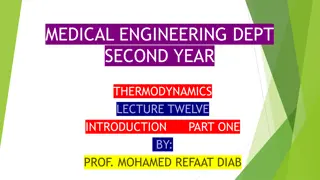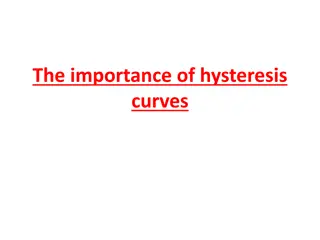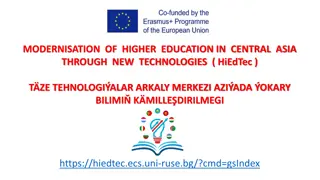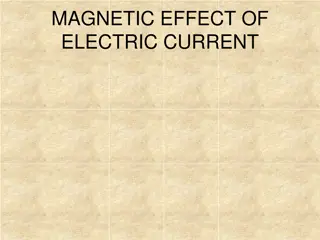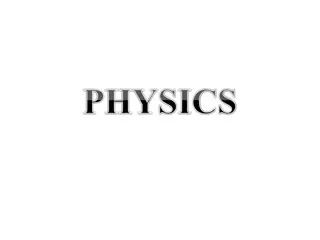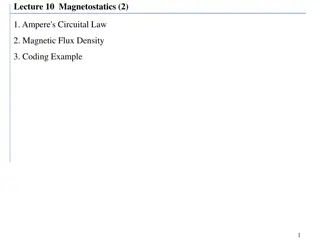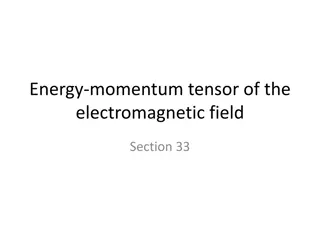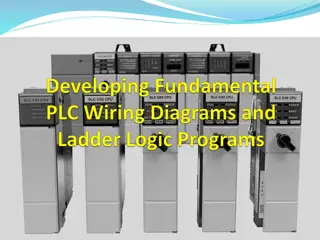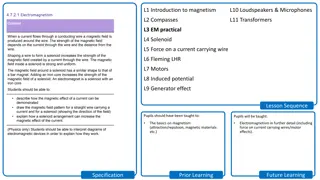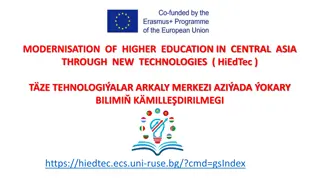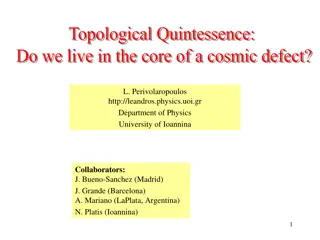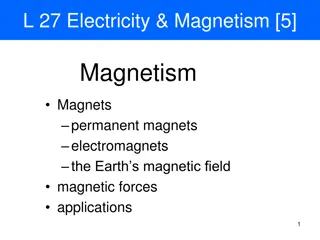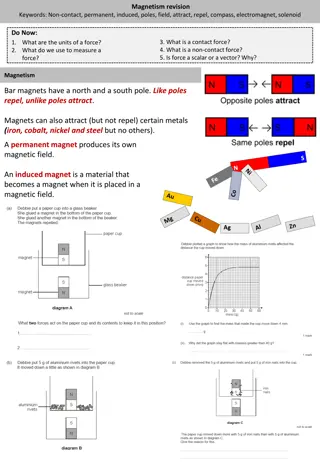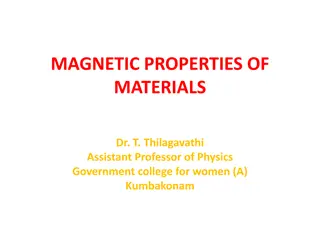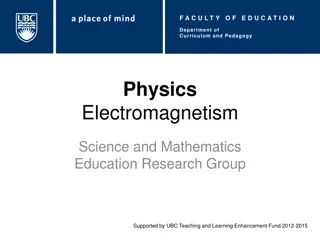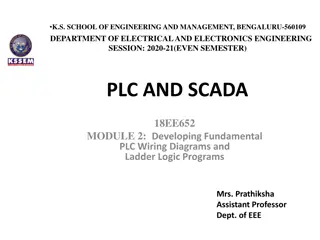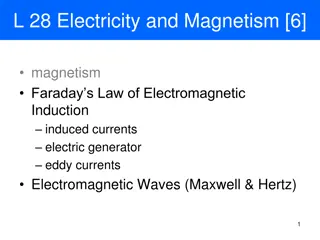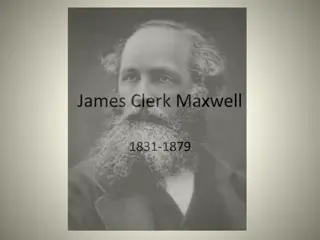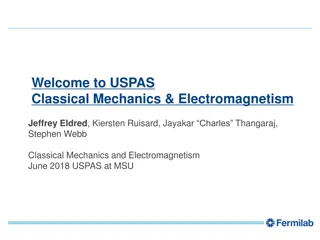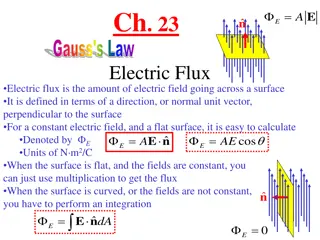Maxwell Equations in Thermodynamics
In thermodynamics, Maxwell equations are derived using Euler's reciprocity relation. They involve characteristic functions such as internal energy, free energy, enthalpy, and Gibbs free energy, along with parameters like temperature, entropy, pressure, and volume. These equations form the foundation
1 views • 15 slides
Hysteresis Curves and Magnetic Materials in Electromagnetism
Hysteresis curves play a crucial role in understanding the properties of ferromagnetic substances like soft iron and steel. The differences in retentivity, coercive force, permeability, and susceptibility between these materials impact their performance in electromagnets and transformer cores. The c
1 views • 12 slides
Modernisation of Higher Education in Central Asia through New Technologies
Modernisation of Higher Education in Central Asia is being facilitated through the implementation of new technologies, particularly in the realm of electromagnetism and automation. Various educational institutions in Turkmenistan are actively involved in improving their curriculum and teaching metho
2 views • 26 slides
Magnetic Effect of Electric Current
Understanding electromagnetism involves recognizing how an electric current in a conductor generates a magnetic field around it. This phenomenon was first observed by Hans Ørsted in 1820, leading to discoveries about magnetic field patterns for various conductor shapes. By studying straight wires,
0 views • 30 slides
Problems and Solutions in Electromagnetism
This content covers various problems and solutions related to electromagnetism, including calculating induced emf in coils, determining magnetic flux, exploring inductors and solenoids, analyzing energy associated with magnetic fields, and more. Detailed explanations and visual aids are provided for
0 views • 9 slides
Comprehensive Overview of GES Physics Syllabus Aligned with Khan Academy Resources
Explore the GES Physics syllabus divided into Mechanics, Thermal Physics, Waves, Electricity and Magnetism, Atomic and Nuclear Physics, and Electronics. The syllabus covers a wide range of topics from introductory physics concepts to advanced topics in thermodynamics, optics, electromagnetism, quant
1 views • 5 slides
Ampere's Circuital Law in Magnetostatics
In this lecture on Magnetostatics, we delve into Ampere's Circuital Law, which is a fundamental concept in electromagnetism. The law provides a general framework for calculating magnetic fields in various scenarios, especially in circular symmetric problems. Through examples and explanations, we exp
0 views • 20 slides
The Energy-Momentum Tensor of the Electromagnetic Field
Exploring the intricacies of the energy-momentum tensor of the electromagnetic field, including its components, symmetries, and implications on field interactions and invariants. Delve into the mathematical derivations and transformations involved in studying this fundamental concept in electromagne
0 views • 19 slides
Electrical Relays and Contactors
An electrical relay is a magnetic switch that utilizes electromagnetism to control contacts. Relays consist of a coil and contacts insulated from each other, with different types like normally open (NO) and normally closed (NC) contacts. Contactors, a specialized type of relay, handle heavy power lo
2 views • 43 slides
Electrical Relays and Contactors
An electrical relay is a magnetic switch that uses electromagnetism to control contacts. Relays can have various contacts and functions, with coils insulated from contacts. They include normally open (NO) and normally closed (NC) contacts for different operations. Contactors are specialized relays f
0 views • 62 slides
Electromagnetism Exploration and Practical Applications
Delve into the fascinating world of electromagnetism with lessons covering magnetism basics, electromagnets, motors, transformers, and more. Students will learn about the principles of magnetism, electromagnet construction, testing methods, and how to increase electromagnet strength. Engage in hands
0 views • 17 slides
Modernising Higher Education in Central Asia Through New Technologies
This project focuses on the modernisation of higher education in Central Asia, particularly in Turkmenistan, through the implementation of new technologies. It emphasizes the use of automation and control systems in technical education, with a specific focus on courses related to measurement devices
0 views • 13 slides
Topological Quintessence: Anomalous Cosmic Anisotropies and Dark Flow Directions
The consistency of Cold Dark Matter (CDM) with observational data has improved over the past decade, but tensions remain with various cosmic anomalies such as preferred anisotropy axes and dark flow directions. Topological Quintessence, a physical mechanism proposed by L. Perivolaropoulos and collab
0 views • 26 slides
Magnetism: From Permanent Magnets to Electromagnetism
Explore the fascinating world of magnetism, covering topics such as permanent magnets, electromagnets, Earth's magnetic field, and the applications of magnetic forces. Discover how magnets work, the properties of permanent magnetism, and the relationship between magnetic and gravitational fields. De
1 views • 25 slides
Magnetism: Concepts and Applications
Understanding magnetism involves learning about magnetic fields, poles, attraction, repulsion, and electromagnetism. Explore how magnets work, magnetic fields interact, and electromagnets are created. Dive into the properties of permanent and induced magnets while uncovering the magic of compasses a
0 views • 4 slides
Magnetic Properties of Materials in Physics
Explore the magnetic properties of materials through concepts such as basic magnetism, hysteresis, electromagnetic force, permeability, coercive force, and magnetic flux density. Delve into the study of magnetic fields, lines of force, and their applications in various engineering materials and magn
2 views • 17 slides
Electromagnetism Problems in Physics Education Research
This content revolves around electromagnetism problems in the field of Physics education research. It includes scenarios where straight wire segments carry current in uniform magnetic fields, challenging the ranking of magnetic force strength on each wire. The solutions and justifications provided o
0 views • 12 slides
Electromagnetic Control Relays in PLC Wiring Diagrams
Electromagnetic control relays play a crucial role in PLC wiring diagrams, enabling the switching of contacts using electromagnetism. This article discusses the function and operation of control relays, their representation in diagrams, and their importance in converting relay schematics to ladder l
0 views • 10 slides
Magnetism: Faraday's Law and Electromagnetic Induction
Explore the fascinating world of magnetism and electromagnetism with insights into Faraday's Law of Electromagnetic Induction, induced currents, and the basic principles of magnetism. Discover how a changing magnetic field can produce a current and unravel the key concepts behind electromagnetic wav
1 views • 24 slides
Electric Currents and Charge Continuity
Explore the concepts of electric currents, charge continuity, volume current density, surface current density, and more through a series of questions and visuals. From understanding the flow of ions in a liquid to calculating current densities in wires, this content delves into essential principles
0 views • 10 slides
The Journey of James Clerk Maxwell: From Curious Child to Pioneer of Electromagnetism
James Clerk Maxwell, born in 1831, showed early signs of brilliance and curiosity. Despite facing obstacles in his education, he excelled in math and physics, eventually making groundbreaking discoveries in electromagnetism. Maxwell's work laid the foundation for modern physics and his legacy contin
0 views • 7 slides
USPAS Classical Mechanics & Electromagnetism Course Overview
This USPAS course covers Classical Mechanics and Electromagnetism with a focus on topics such as Hamiltonian mechanics, accelerator magnets, relativity, and more. Taught by a team of expert instructors, the course structure includes lectures, homework sessions, exams, and graded assignments. Resourc
0 views • 7 slides
Ch. 23
Gauss's Law in electromagnetism relates electric fields to electric charges. Electric flux, defined as the amount of an electric field crossing a surface, plays a crucial role in understanding the behavior of electric fields in various situations. This content delves into the principles of Gauss's L
0 views • 22 slides
Transmission Lines & Resonators
In this study, delve into the intricate world of transmission lines and resonators as discussed in the Classical Mechanics and Electromagnetism course by Jeffrey Eldred at USPAS, MSU. Explore topics such as lumped circuit models, characteristic impedance, phase velocity, voltage reflection coefficie
0 views • 15 slides
Classical Mechanics and Electromagnetism Overview
Delve into the intricacies of classical mechanics and electromagnetism through detailed discussions on topics such as plane waves, Lienard-Wiechert potentials, Maxwell's equations, Poynting vector, and retarded time. Explore the fundamental principles and concepts that govern the behavior of electro
0 views • 18 slides
